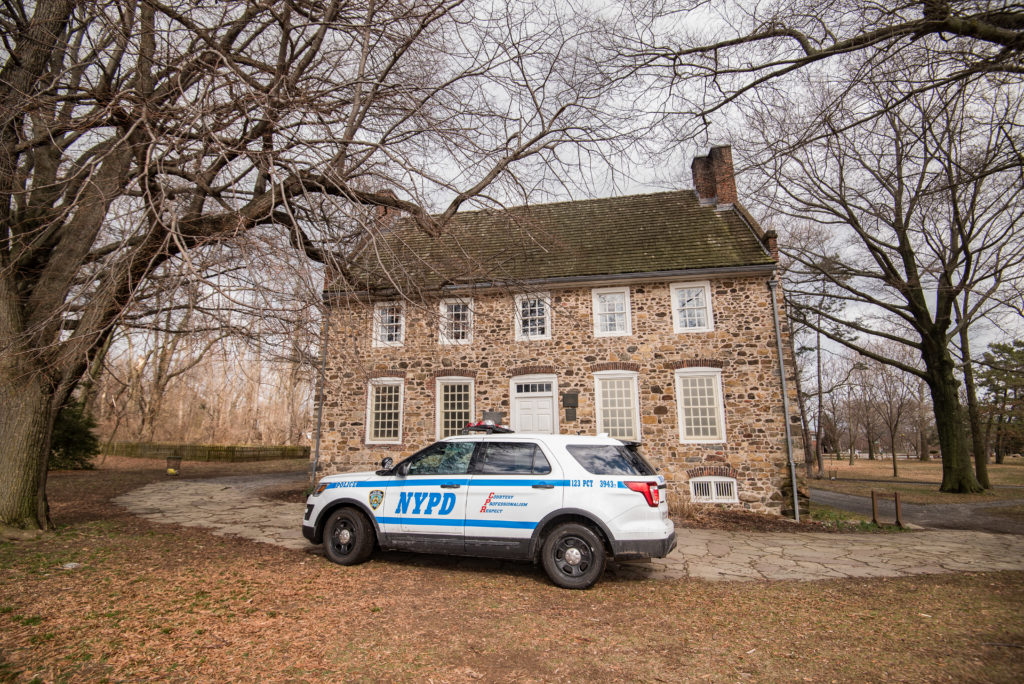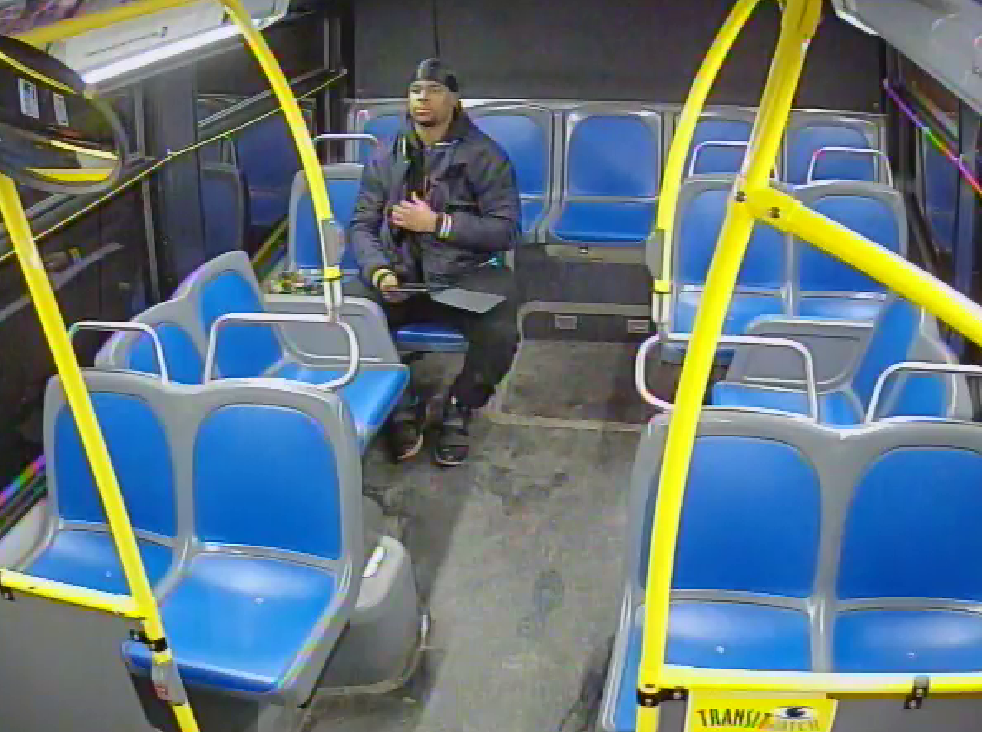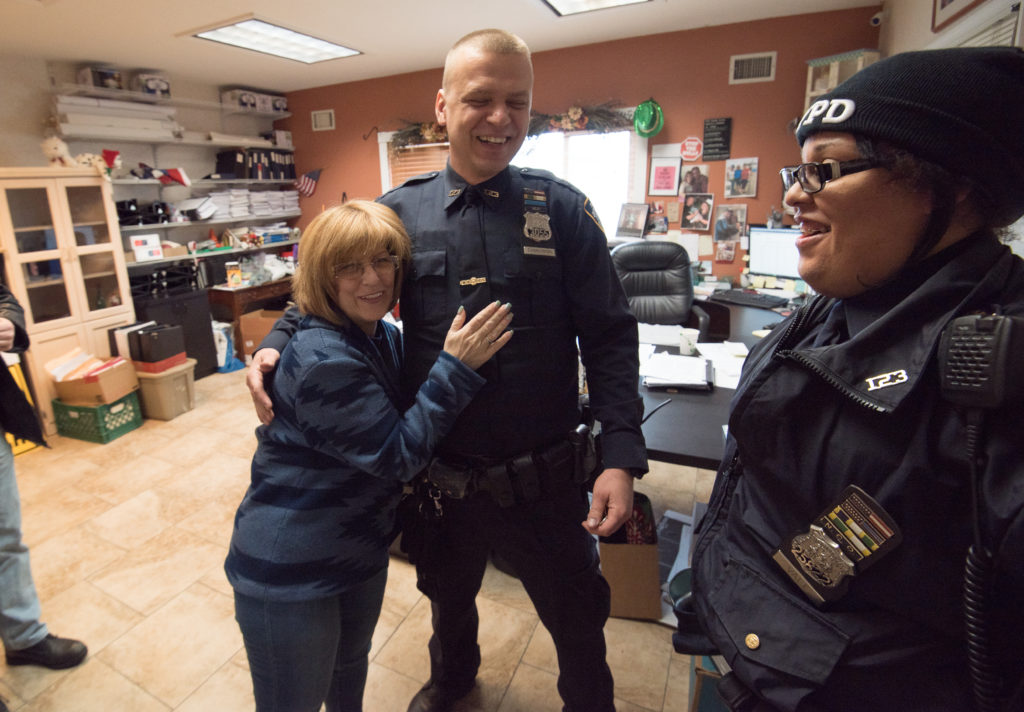Your Neighborhood Police: 123rd Precinct, Staten Island
June 14, 2018
Staten Island is the most out-of-the way part of New York City, and the 123rd Precinct covers the most out-of-the way part of Staten Island, on the South Shore, including the neighborhoods of Tottenville, Eltingville, Charleston, Prince's Bay, Rossville, and Annadale. There are old Colonial and Victorian houses that date from long before the station house was built, in 1922, when visitors to the borough could only come and go by boat. Now, there are newer ranches, split-levels, and communities of townhouse developments, but plenty of land is still open and green. Last October, an upstate man was arrested in Tottenville for hiding in a tree with a bow and arrow, as he lay in wait for a passing deer.
Neighborhood Policing was introduced in the 123 in May 2017. The precinct is divided into three sectors, A, B, and C — Adam, Boy, and Charlie, in police parlance — and the Neighborhood Coordination Officers (NCOs) for Sector Charlie are Crystal Vale and Marcin Dabrowski. Vale is a third-generation cop and a native Staten Islander, fluent in Spanish and competent in French. She's on the short side and dark-haired, outgoing and quick to laugh; her partner is none of those things. Dabrowski moved with his family to Brooklyn from Golkowice, a village in southern Poland, when he was sixteen. His father had been a coal miner. He joined the NYPD in September 2011, and Vale came on six months later. Asked how his particular skills complement those of his partner, Dabrowski considered before replying, "She can write. I can run."
Vale said, "He runs ten miles to work every morning."
Dabrowski shrugged. "Only in good weather. Sometimes, I bike."
"Neighborhood Policing is less than three years old, and its adaptive, collaborative approach to problem-solving guarantees that it will forever remain a work in progress."
Though the partnership is only as old as the program, it seems as if Vale and Dabrowski have known each other far longer, and their familiarity with the neighborhood is just as easy and sure. Driving around, they pointed out the sights, such as the Mount Loretto church, which served as the location for the christening scene in The Godfather, and Spanish Camp, a former beach bungalow colony. A developer bought the property, and the cottage where radical Catholic activist Dorothy Day had lived was bulldozed hours before it could be declared a historic landmark. The developer went bankrupt, and the remaining structures, never inhabited, have become eyesores. Locals kids have parties there. "We're working with Sanitation on a big clean-up," said Vale.

The immersion into the life of the community has required some adjustment. NCOs carry smartphones, and residents can contact them, by text, phone, or email, night and day, on-duty and off. Vale said, "At one point, 1PP," — One Police Plaza, the address for headquarters — "wanted us to fill out a form each time we responded to an email. We'd get twenty a day!"
Dabrowski said that there were problems he didn't know how to address. Certain noise complaints, for example: "On foggy nights, the boat horns from the harbor, you can hear them. It's a Coast Guard rule, the boats have to blow the horns. In the summer, the helicopters spray for West Nile. People don't like the helicopter noise, the horns from the boats. 'It's too loud.'" He seemed distressed by the prospect that his responsibilities in Sector Charlie extended to the skies and seas. "What am I supposed to do?"
The constant calls seem more manageable now. "People know when we're working," Vale said. If they're not, and the issue is important, they'll pass on the message to the sector car on duty. And the daily contact with the neighborhood, ordinary and immediate, has paid off: "The kids, they know us by our first names."
"Not mine," said Dabrowski, whose first name is pronounced MAR-cheen. Vale avoids the challenges of Slavic pronunciation by calling him "Deebo."
On a recent afternoon, they paid a visit to Mrs. Kuga's fifth grade class at PS 42, where they'd taught an eight-week program called "Too Good for Drugs." Vale reminded the children of their lessons about alcohol and peer pressure, and a girl replied, "One of my brothers is a police officer, and one's a Marine, so I think I'm good."
Stopping by a corner pizza place for lunch, Dabrowski remarked to the owner, "I see you're doing better with the parking."
The owner laughed as he replied, "Because you yelled at me."
The two men went on to discuss the challenges of getting a traffic light installed where a stop sign currently stood. The owner said that an urgent care clinic was being built across the street, and the need for a stoplight would be all the more pressing. "I start cooking early. They're gonna smell my chicken in the morning."
Vale and Dabrowski patrol streets with names like Mayberry Promenade. The problems of the people who live on Mayberry Promenade might not seem like big city problems, and they usually aren't. In February, they had to deal with a hit-and-run accident, in which two cars belonging to a couple who lived on the street were damaged. The officers had been off-duty at the time, and the report didn't suggest that anything particularly life-changing, or tragic, or even newsworthy had occurred. But for the couple who owned the cars, it mattered a great deal. One of the cars couldn't be driven, and they didn't have collision insurance; the cost of repair was significant, and they needed both cars to get to work and to care for their daughter with autism. Vale and Dabrowski spent a week canvassing for video cameras, house to house, until they were able to identify the car and track down the owner. "He admitted it, right away," said Vale. "And he paid to fix the damages."
For all the suburban comforts of life on the South Shore, the community has not been spared its share of afflictions. The opioid crisis has struck Staten Island with particular virulence — Vale has saved three overdose victims with Narcan — and most of the treatment facilities are concentrated on the North Shore. Car break-ins are a persistent issue, and some addicts do not confine themselves to non-violent means to supply their habits. One night, Vale and Dabrowski were working when they received two calls in short order: a cab dispatcher reported that one of his drivers was afraid his passenger was casing robbery locations; a worker at a gas station reported that the odd behavior of a taxi passenger led them to believe he was planning a stick-up. The passenger wore a hood and had his face covered, "like Kenny on South Park." He picked up a case of beer, brought it to the cashier, rummaged through items on the counter, and then walked away.
Vale and Dabroswki were attempting to get the video from the gas station when a third call came in — a knife-point robbery at a Chinese restaurant in a strip mall a few blocks away. In the CCTV footage from the restaurant, the suspect is masked, but Vale and Dabrowski knew that the deli next door had high-quality surveillance cameras. They called the deli owner at home and asked him to come in. One of the outdoor cameras captured a few seconds of footage in which the suspect felt comfortable enough to take off his hood, showing his face. Detective Steven Lutz responded from another robbery, in the 121st Precinct, that had been committed by the same suspect. He credited Vale and Dabroswki for calling the cab driver back to the scene, which allowed him to connect the two crimes, and make an arrest soon after.
* * *
Neighborhood Policing is less than three years old, and its adaptive, collaborative approach to problem-solving guarantees that it will forever remain a work in progress. Not every precinct has managed to find and keep the right cops for the job. As such, when a letter of effusive praise for the NCOs of Sector Boy arrived at the 123rd Precinct on the same day as a visitor from headquarters, it was remarked that the timing was suspicious. Sergeant Joseph D'Albero, who supervises the NCOs, rushed to find the letter-writer, Virginia Peterson, and asked her if she might be available to speak. As it happened, she was even more enthusiastic in person.
Mrs. Peterson and her husband, John, a retired firefighter, raised their eight children in a house at the end of a secluded, tree-lined cul-de-sac. From their deck, they could look out at Raritan Bay and watch the great ships pass, the tankers and the dayliners, as well as sailboats and catamarans like the ones on which their kids first learned to love the water. But for a year, the deck also provided an even closer view of the burgeoning open-air drug market next to their house. Dealers had also found the isolation of the street conducive to their needs. Cars came and went at all hours, blasting music. Mrs. Peterson is not a shy woman, and she told them to move. Threats and curses came in response, and garbage was tossed into her yard. She became concerned that the retaliation would escalate, and her children warned her not to provoke the dealers. "I felt trapped, like a hostage in my own house," she said. Her husband has a variety of ailments, some related to his work at Ground Zero. She took pictures of the cars, wrote down license plates, and complained to anyone who would listen. Still, nothing happened for a long time.
"They were an answer to my prayers. It’s a whole world of difference."
When a friend from the Tottenville Civic Association told her about the "Build the Block" meetings that encouraged the neighborhood to have a say in Neighborhood Policing, Mrs. Peterson attended the first one. She met Officers Vincent Casaletto and Christine Bungay that night, and they began writing tickets and making arrests the next day. Within two weeks, Mrs. Peterson said, the word finally spread. The same kids who were telling their friends that her street was the place to buy drugs now warned them that the party was over.

Standing beside the sweeping bare branches of the pin oaks at the edge of her yard, Mrs. Peterson pointed out where the traffic would gather. "Cars would park there. I could see them on their cell phones, when other cars would pull up, hand things back and forth. My husband, he has health issues—"
"Really, I'm not that bad," Mr. Peterson interjected, reluctant to be written off as an invalid. He'd moved to the South Shore when he was twelve, from Brooklyn, and was puzzled to learn that a favorite pastime of the local boys was trapping muskrats.
Mrs. Peterson pointed to Casaletto and the other officers. "They were an answer to my prayers," she said. "It's a whole world of difference. Night and day. I know they're around. My husband, he has health issues—"
"There she goes again," sighed Mr. Peterson. He beckoned to Casaletto, as if requesting back-up: "He saw me running on the beach the other day!"
"Well, he's getting older," Mrs. Peterson insisted.
"Older!" said Mr. Peterson. "Everybody is!"
Casaletto has gotten to know other people in the neighborhood who admire him less than the Petersons. He was driving home from the precinct and had stopped at a traffic light when he noticed a group of teenagers on the corner. They were across the street from a memorial to 17 local residents who had died in 9/11, 13 of them New York City firefighters. It was 1:30 in the morning. Casaletto recognized two of them from past arrests. He'd locked up one for stealing an all-terrain vehicle. Still, they weren't doing anything wrong at the time; when the light changed, he drove home. The next morning, he learned that the 9/11 memorial had been vandalized — American flags that adorned the fence had been broken and tossed onto the sidewalk. The neighborhood was furious, and so was Casaletto.
He knew that there was an NYPD Argus camera near the memorial. After spending hours reviewing the footage, he found what he was looking for: there was the 16-year-old he'd arrested for stealing the ATV, knocking the flags to the ground. Casaletto arrested him again. Many grateful Tottenville residents turned out for the ceremony when the Staten Island Advance named him "Cop of the Month."
Elio Chianetta has been a cop for three years, and he wanted to join the NCO program as soon as he heard about it. When Casaletto's old partner transferred to Community Affairs, Chianetta asked Captain Noonan to be considered for her position. "You have more time to look into things, to build relationships," he said. "You get to enjoy doing police work, instead of just chasing the radio 24/7."
Chianetta took the time to look into things the night after Sgt. Alex Pasynkov and Officer Alyssa Fazio tried to make a car stop. They saw a 2012 Hyundai with out-of-state plates turn without signaling, then stop in the middle of the street, as if to case a house. When they pulled up alongside the driver, the other car drove off, accelerating when Pasynkov hit the lights. The Hyundai crashed and the driver ran, ducking into a backyard and hopping fences. Pasynkov and Fazio lost him, but they found a cell phone he'd dropped. The Hyundai turned out to have been stolen.
An iPad was recovered from the back seat of the crashed Hyundai, and a lieutenant handed it to Chianetta and said, "See if you can find something." It had been stolen during a separate car break-in, it turned out, and Chianetta tracked down the owner, who didn't even know it had been taken. Digging deeper, Chianetta examined the location data, and found that the device had been at two intersections, just after the theft — Hylan Boulevard and Sprague Street, then Castleton Avenue and Clove Road — which he recognized as bus stops. The time was around 4 in the morning, which meant that there wouldn't be a lot of passengers on the bus. Chianetta contacted the MTA, which provided footage from the S78 Bus, the only one running at that time. The sole passenger is carrying an iPad.

Chianetta knew the suspect, since his picture was posted in the precinct as a Grand Larceny recidivist: "He's all over the walls." The cell phone found at the scene of the car crash belonged to the same man. The detective who was later assigned the case had a good deal of the detecting done for him by the neighborhood cop.
* * *
When Vale and Dabrowski stopped by Aspen Knolls, a neat development of Federal-style townhouses, Eileen Pacheco, one of the managers, greeted them with hugs. Vale told her about the next "Build the Block" meeting, in June, which would be held at the development's community room. Pacheco called out to the back, "Michele! June 14, put it in the book! It's Flag Day, we'll bring flags. I'll take care of refreshments, snacks.'
"Captain Noonan, at the precinct, he'll treat for refreshments," Dabrowski said.
Pacheco reminded the officers that a family emergency had prevented her from attending the previous meeting. "The last one, it was a big success, wasn't it?"
"Thirteen people," shrugged Dabrowski. "So, not really. But the church we had was double-booked, and we had the nor'easter that night. We'll do better this time."
"This time, no excuses," said Pacheco.
"We'll knock on doors," said Vale. "You have my number, right?"
"I have it on speed dial," said Pacheco.
Pacheco and Vale went on to talk about the "Prom Impact" program, in which dresses are donated for high school girls, and that Vale runs for the precinct. She had just delivered over 200 of them to the Bronx, and wanted to know if anyone in the neighborhood might want one, or might have one to offer. Pacheco said she'd ask around, and that Vale could store the dresses she'd collected on site.
"You have more time to look into things, to build relationships. You get to enjoy doing police work, instead of just chasing the radio 24/7."
Asked about her affectionate rapport with the NCOs, Pacheco replied that she's counted herself lucky to have them since a missing person case in the development, several months ago. A middle-aged woman with schizoaffective disorder had disappeared from the care of her mother, a reclusive immigrant who was beginning to show signs of dementia herself. Though the older woman managed to convey the barest facts of her daughter's departure to the responding officer, real communication proved impossible. When Ms. Pacheco found out that the woman spoke Polish, however, she knew the man for the job. Dabrowski was called, and he managed to get the woman talking, calming her down and drawing her out. The daughter was found soon after.
"Now, people come to me with things," Ms. Pacheco said. "They might be little, things they thought might not have been important enough to tell the police. Or big things, but they were embarrassed, they didn't have the level of trust. Now, they'll come to me and say, 'Let Crystal know.' Or 'Handsome.'"
Vale turned to her partner and asked, "What's the Polish word for 'handsome'?"
"It's ładny," he replied.
Ms. Pacheco corrected him. "The Polish word for handsome is 'Dabrowski.'"






